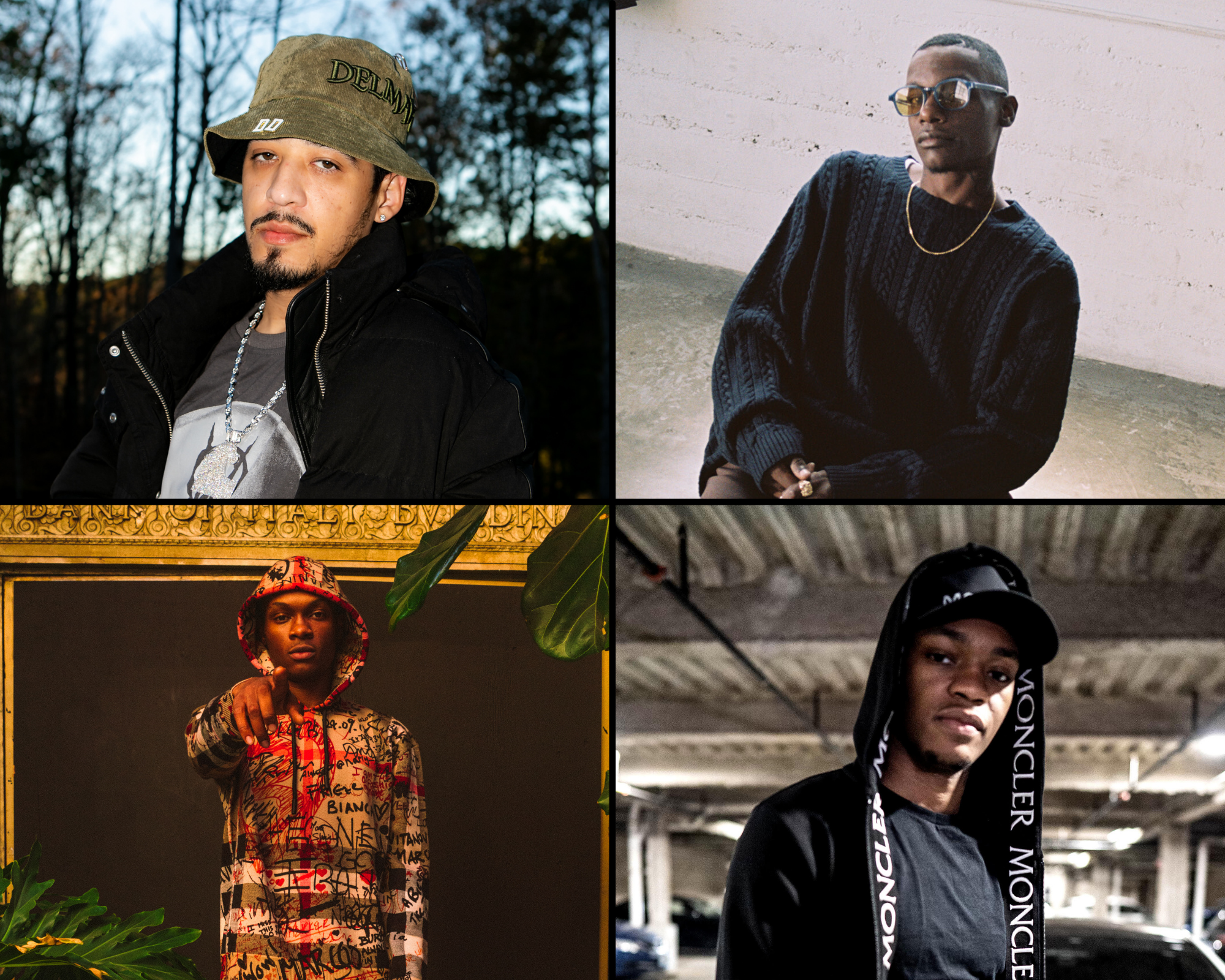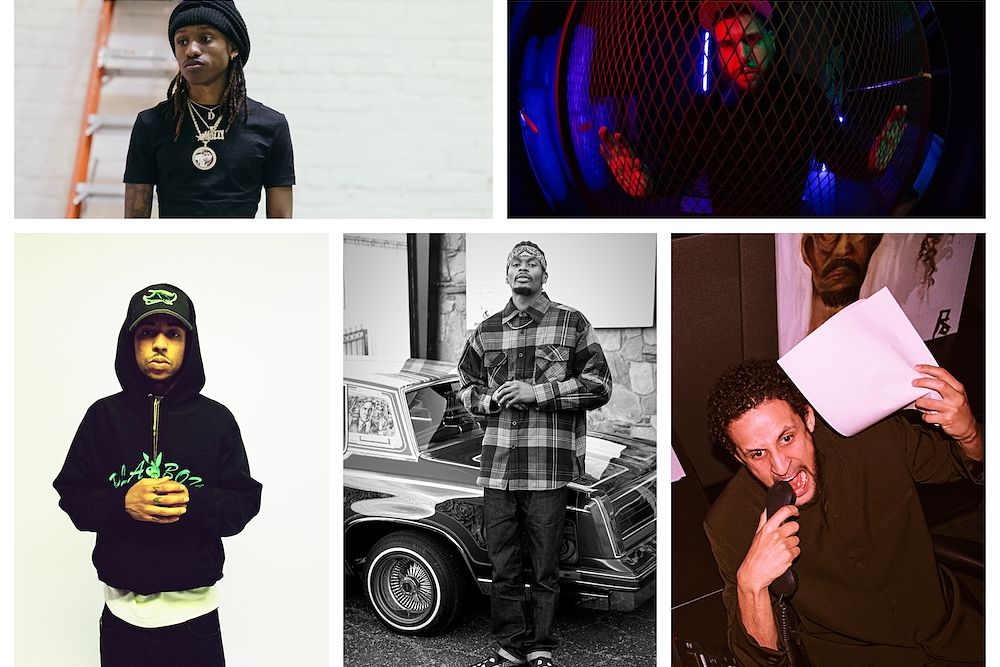Rap isn’t a sport. It’s an art, a genre of music with so many nuances that the debate over what qualities constitute a “good rapper” is endless, the answer forever subjective.
But the parallels exist. Rap, like sports, favors the young. Their energy and potential for innovation can “change the game.” Rhyming in certain cadences or at high speeds, like an athlete’s quickness or vertical jump, is either an innate gift or the result of devoted practice. Rap fans (and rappers, of course) compare album sales, streaming numbers, and video views like wins/loss records or points per game. For these reasons and more, rap is rife with athletic similes. Cataloging the number of lyrical references to athletes in a given year alone would be a Sisyphean endeavor.
So it goes that rap fans and journalists are always scouting for “the next” rapper, the one whose music will transcend the subjective, the one whose greatness, like LeBron James or the late Kobe Bryant, will be undeniable. What is the rap equivalent of carrying your team to a championship or scoring 81 points in a game?
This is the spirit of Blue Chips, a monthly rap column that doubles as a scouting report. (Yes, it is named after the cinematic masterpiece for which Nick Nolte deserved an Oscar and Shaq should’ve received, at the very least, a best-supporting nomination.) It’s a monthly starting five, a group of rappers who have the potential to be Hall-of-Famers but could just as easily flame out. Ideally, through these brief and single-focused introductions, you’ll hear/see why they’ve made the cut and their potential for objective greatness.

Also Read
Blue Chips: January 2021 in New Hip Hop
If you don’t see your new favorite in the column this month, it’s possible they’ll make it the next. These predictions are as fallible as the person behind the keyboard and every scout getting paid to predict the next Shaq. Someone had to argue for Michael Olowokandi and Greg Oden, right?
Ray Wright – “The Rock”
Ray Wright has had my vote for “L.A.’s Best Kept Secret” for a decade. Since 2010, he’s been the MVP of Warm Brew, the Dogtown triumvirate riding for the disenfranchised and perennially hustling folks who live in rent-controlled or subsidized apartments just walking distance from multi-million dollar beach bungalows. Listen to Warm Brew’s catalog and find that Wright has more hooks than Kareem (e.g., “Let’s Get Paid”). If you miss Nate Dogg, he’s one of the closest reincarnations. He can rap as well as he croons. His voice has the same resonance and flavor, the rare combination of gravitas and nonchalance. Consistently faded at the function, he remains unfadeable. Apart from features on tracks with LA luminaries like G Perico and Jay Worthy, however, Wright has never released a solo song or project until now.
“The Rock” is one of the five tracks from Wright’s debut solo EP, III Decades, and arguably the best of the assured and polished bunch. (“Campaign” is a close second). Basketball similes and metaphors abound in rap, but Wright goes coast-to-coast without a misstep. His voice cuts through every thundering drum on the beat from Al B Smoov and Fizzle as he raps about making moves off the pick and roll and passing dimes to his bros. Wright gets an excellent auto-tuned assist from Desto Dubb, a first-ballot candidate for juice salesman of the 2010s, but this is the sole feature on III Decades. He’s thrown lobs to his teammates for years—“The Rock” and III Decades offer a glimpse of Wight’s potential with an isolation play.
White John – “Crazy”
Rucci remains Inglewood’s greatest rap talent since Mack 10 stalked boulevards and backyards from Manchester to Centinela. He’s played sold-out venues in L.A. and Rolling Loud. According to Rucci, though, “White John is next.” Endorsing your homie is the fifth element of hip-hop, but rappers are often the best A&Rs, better attuned to who and what will pop in their neighborhood than any record label lackey who got their gig from an uncle. In this case, Rucci is right. White John’s breakout single, “ShowTime”, dropped in August 2019 and has amassed almost 300,000 views without PR or coverage from major outlets. It succeeds because of White John’s drug-addled charisma and a frenetic, key-riddled beat that complements his slowed delivery. The self-proclaimed “Mr. Fuck LAPD”, John has a swagger undoubtedly forged by moving in Piru sections of the city. He’s a neighborhood star who’s never seen a pill or seal he didn’t want to pop, a DM from a BM (baby momma) that he wouldn’t answer. When he raps, he sounds both laidback and unhinged.
“ShowTime” doesn’t appear on his debut project, Cases Pending, but it doesn’t need to. There are tracks like “Crazy,” his most ambitious yet. On the hook, he half sings about the mania that comes from sitting in a cell when your girl won’t answer the phone and downing seizure-inducing amounts of molly. The rest of the song is one deftly delivered flex after another, a list of designer clothes copped, money made, and women laid. It’s a strange dissonance, a song that sounds like a lament and a celebration. Throughout, John bounces over the beat, sounding looser and more assured than he did on “ShowTime” just months ago. If he continues to improve at this rate, he might be next up far beyond Inglewood.
Doggystyleeee – “We Different”
G-funk faded after the ‘90s, but it continues to shape the sensibilities of subsequent generations. If you grew up in LA, listening to Dre, Snoop, Quik, and their compatriots on the radio or at backyard barbeques was a rite of passage. Drums and basslines that sound like bouncing ’64s smacking concrete, the squealing and glinting synths, the slang and inflections delivered by members of different sets—if you’re from here, they feel as natural as the sun, sand, and smog.
Doggystyleeee (yes, four E’s), all of 25-year-old, is from San Bernardino—roughly 30 miles east from the edge of L.A. County—but the influences remain the same. You can see his predecessors in his sartorial preferences—checkered Pendletons, pressed Dickies—and hear it in his flow and beat selection. Last month, Doggystleeee released Into Something, Vol. 2, a follow-up to his 2019 debut. It’s a continuation of the sound on his single “We Different”, which continues to gain traction online. “We Different” is G-funk at its most dismal. The synths are eerie, ghost-like, and the minor piano keys sound like part of a dirge. Doggystyleeee spends most of the track confidently spitting avowals of regional and set pride. He draws a line in the sand for the other side and out-of-towners. The sound and themes aren’t different, but neither are the socioeconomic injustices that bred g-funk. This is revivalism done right.
Rhys Langston – “Nebbish Frederick Douglass”
L.A. is the home of art rap. The avant-garde exists in other locales, but it’s flourished here for decades. You can trace the lineage from groups freestyling at The Good Life Cafe to ciphers at Project Blowed to performances at Low-End Theory. Rhys Langston is proudly part of this tradition, creating some of the most formally challenging and intellectually rigorous rap anywhere.
His latest album, Language Arts Unit (POW Recordings), is staggering both for its content and its composition. Artists have painted their album covers before, but few have written accompanying 100-plus page screeds on the rap industry that rail against the way we consume and disseminate art in the age of the endless timeline. The album mirrors the book. There is no hand-holding, and Langston makes no concessions. Listening means replaying to grasp every idea and emotion. These are hyper-literate, anti-establishment raps that bend and break language like the best poetry. “Nebbish Frederick Douglass” is the heart of the album, Langston’s simultaneous affirmation of his art and his black and Jewish identity in a world antagonistic to all of it. When he calls himself a “peanut butter Sandy Koufax,” you believe he could throw a no-hitter. His greatest gift here and everywhere on the album is distilling his ideas into lines like these, lines that are approachable but require active dissection.
ShooterGang Kony – “Jungle”
ShooterGang Kony is an excellent name for SEO, but it put the Sacramento rapper in the crosshairs of racist judges enforcing draconian gang enhancements. At 15, Kony spent months in jail due to said enhancements. Fortunately, the punitive setbacks haven’t stopped him. He’s from Oak Park—the historically poverty-stricken, gang-heavy Sacramento neighborhood that begat Mozzy—and prepared for all adversity. After a string of increasingly promising projects, the 21-year-old is poised to be Sacramento’s (and Oak Park’s) next star.
More often than not, Kony is more boisterous and less weary than Mozzy. He too has lost friends-turned-family to prison and gun violence, but the difference in tone and temperament probably has more to do with age and beat selection. On Red Paint Reverend, his latest and best album to date, Kony is alternately celebratory (“Bussdown”) and grave (“A Sinner’s Story”). “Jungle” is stuck in the middle. It’s a slap calibrated to fry your sub that thumps around a clipped and pitched vocal sample. But the lyrics are sobering. Both verses begin with calls to free incarcerated kin. Kony has jewelry that inspires all aquatic metaphors, but there’s still “murder in the air.” One can only hope that Kony’s life continues to improve as his stature rises, that he’ll have more wins to toast and fewer occasions to pour one out for the departed.




